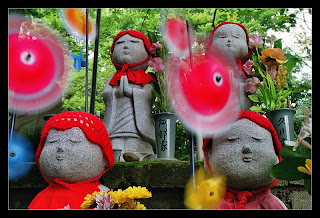
Kṣitigarbha, known by the Japanese name Jizō (地蔵) or the Mandarin Chinese name Dizang (地藏 Dìzàng), is a popular Mahayana Buddhist Bodhisattva, usually depicted as a Buddhist monk in East Asia. The name Jizō may be translated as "Earth Treasury", "Earth Store", "Earth Matrix", or "Earth Womb."
Kṣitigarbha is often referred to, because of his vow not to achieve Buddhahood until all hells are emptied, as the bodhisattva of the hell beings. His famous vow recited by many Buddhists is "Not until the hells are emptied will I become a Buddha; Not until all beings are saved will I certify to Bodhi."

In Japan, Jizō, or Ojizō-sama as he is respectfully known, is one of the most loved of all Japanese divinities. His statues are a common sight, especially by roadsides and in graveyards. Traditionally, he is seen as the guardian of children, particularly children who died before their parents. Since the 1980s, the tendency developed in which he was worshipped as the guardian of the souls of mizuko, the souls of stillborn, miscarried fetuses. In Japanese mythology, it is said that the souls of children who die before their parents are unable to cross the mythical Sanzu River on their way to the afterlife because they have not had the chance to accumulate enough good deeds and because they have made the parents suffer. It is believed that Jizō saves these souls from having to pile stones eternally on the bank of the river as penance, by hiding them from demons in his robe, and letting them hear mantras.

Jizō statues are usually accompanied by a little pile of stones and pebbles, put there by people in the hope that it would shorten the time children have to suffer in the underworld (the act is derived from the tradition of building stupas as an act of merit-making) . The statues can sometimes be seen wearing tiny children's clothing or bibs, or with toys, put there by grieving parents to help their lost ones and hoping that Jizō would specially protect them. Sometimes the offerings are put there by parents to thank Jizō for saving their children from a serious illness. Jizō's features are also commonly made more babylike in order to resemble the children he protects.

As he is seen as the saviour of souls who have to suffer in the underworld, his statues are common in cemeteries. He is also believed to be the protective deity of travellers, and roadside statues of Jizō are a common sight in Japan. Firefighters are also believed to be under the protection of Jizō.

No comments:
Post a Comment